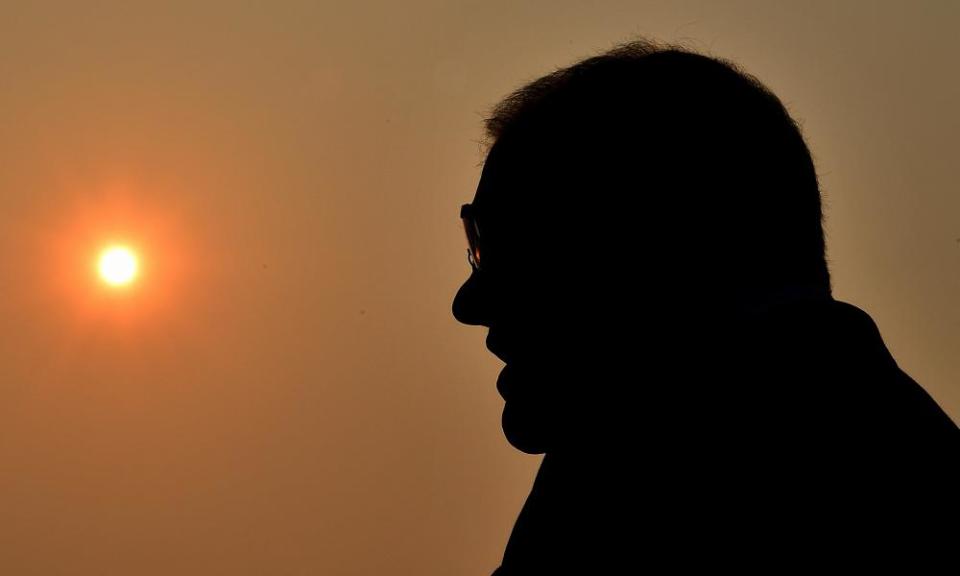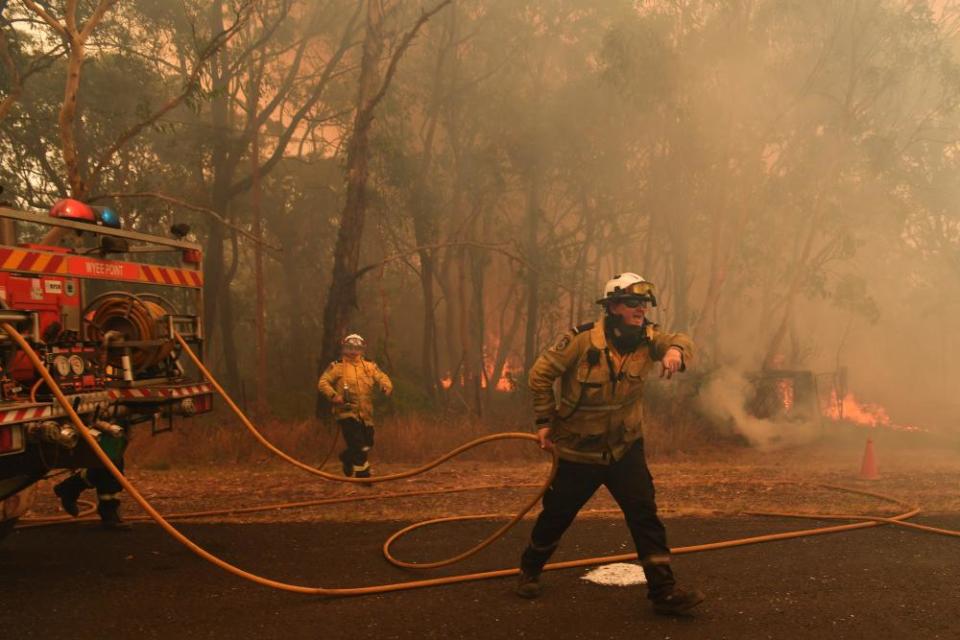Scott Morrison rejects calls for more bushfire help, saying volunteer firefighters 'want to be there'

The prime minister has rejected calls for more help for firefighters as the New South Wales bushfire crisis is expected to worsen.
There were 85 fires burning across NSW on Tuesday, and 42 were uncontrolled. With predictions of temperatures surpassing 40C and a wind change for the afternoon, firefighters expected conditions to deteriorate.
About 2,700 firefighters are in the field, many from volunteer NSW Rural Fire Service brigades.
As smoke brought the city’s air quality to more than 11 times the hazardous level, Scott Morrison spoke in Sydney about the religious discrimination bill.
Asked about concerns over how long the tens of thousands of volunteer firefighters – many who have been away from work for weeks now – were expected to continue without pay, Morrison said they “want to be there”.
“These fires have been going on for some months now and when I was speaking with the commissioner on the weekend out where we have the megafire at the moment we were talking through the crew rotations,” he said.
“And the fact is these crews, yes, they’re tired, but they also want to be out there defending their communities. And so we do all we can to rotate the shifts to give them those breaks but … in many cases you’ve got to hold them back to make sure they get that rest. And I thank them all for what they’re doing, particularly all those who support them.”
He rejected suggestions that volunteer firefighters – who reportedly make up the largest volunteer firefighting force in the world – should be professionalised.
“The volunteer effort is a big part of our natural disaster response and it is a big part of how Australia has always dealt with these issues,” Morrison said.
“We are constantly looking at ways to better facilitate the volunteer effort, but to professionalise that at that scale is not a matter that has previously been accepted and it’s not currently under consideration by the government.”
There are reports of RFS brigades crowdfunding or seeking donations for water and food for those in the field.

Morrison did not address that and he rejected suggestions there was more the federal government could do. He said state governments get everything they request from the commonwealth, whether that was logistics and support or assistance from the Australian defence force.
“I know what the practice is and I know what the experience is and I know what’s happening on the ground and I know that whether it’s the ADF or any other agency of the commonwealth, all of those agencies, our efforts have been … directed and channelled into the response of the state and territory staff on the ground,” he said.
“That is what was intended to be set up and that is operating, and I’m pleased with the way those arrangements are being worked out. And if there is any other matter that would need to be addressed, it would be raised with the commonwealth, because there is a direct line to make sure that happens.”
The government has rejected a call from the independent MP Andrew Wilkie to use air force transport planes to waterbomb.
Morrison also rejected calls by the opposition and by his predecessor, Malcolm Turnbull, for a nationally coordinated response to the fires.
Turnbull said emergency management in Australia needed to be restructured because the threat was now a “national security issue”.
“The national government has to provide leadership,” he said. “Obviously the federal government can’t do everything but the federal government’s job is to lead and this is an issue that needs leadership.”
Morrison said there already was a “nationally coordinated effort” which he did not think could go any higher.
“It’s led by a cabinet minister who reports directly to me and I deal with it directly with the premiers of the states and chief ministers of the territories,” he said.
The Australasian Fire and Emergency Service Authorities Council (Afac) said cross-state firefighting resources were funnelled and distributed across the country where they had been requested, by its national resource sharing centre.
“While many volunteers are not available to travel far from their homes or interstate due to local responsibilities, employment or managing drought-stricken stock that require daily feeding, others are prepared to deploy,” Afac said.
It said there was integrated engagement with the commonwealth and national protocols for managing incident responses and the available fleet of 140 aircraft and international personnel.
“Australia has never been better prepared to face natural disasters,” it said.
Leading scientists said this week that the fires should be a “wake-up call” for the government about the lack of focus on the climate crisis, with climate experts telling Guardian Australia they were “bewildered” how little attention the emergency had been given during the last parliamentary sitting week of the year.
Last month a coalition of former climate chiefs said the government “fundamentally doesn’t like talking about climate change” and that it had ignored their advice for political reasons. The group of 23 fire and other emergency chiefs had tried to meet with Morrison since April, but said they had been “locked out” of discussions.
On Tuesday Morrison said the government’s climate change policy was in the “sensible centre” of balancing environmental and economic needs, and was meeting emissions reductions targets.
“Our actions on climate change are getting the results they’re intended to get,” he said.
Australia is not on track to meet its emissions targets without using carryover credits from the Kyoto period, an accounting trick other nations have ruled out using and which is being challenged by about 100 countries at the UN climate talks in Madrid.

 Yahoo News
Yahoo News 